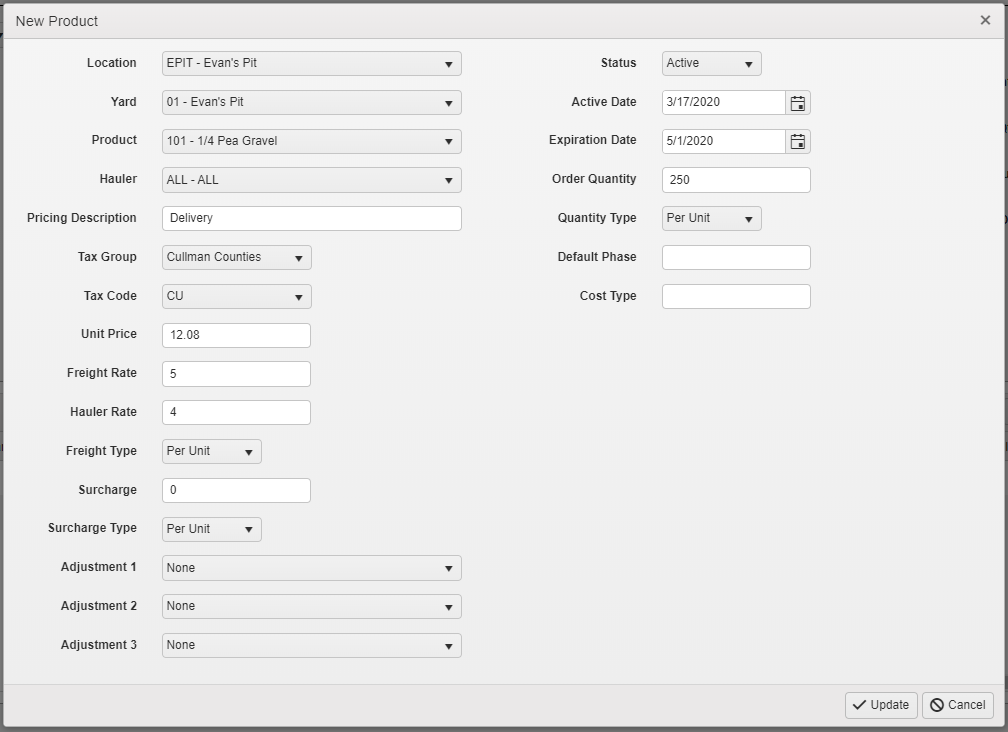Creating & Managing Orders
Fast-Weigh Web Portal
Ticketing cannot be done until there is an Order in the system to ticket for. Before an Order can be complete, it must have a Region, Description, Customer, and at least one Product added to it or be marked as Open.
Establishing New Orders
To build a new Order, click the [+ New Order] button.
 Required fields are notated below with an asterisk *
Required fields are notated below with an asterisk *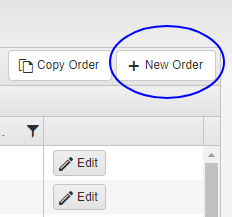
- Order Number: Automatically assigned by the system. This field cannot be filled or changed by the user.
- * Description: Create a name, title, or other description of the Order here.
- Status: Mark the Order active, inactive, or closed.
- Active: Orders are currently being ticketed.
- Inactive: Orders cannot be ticketed for, but they may be reactivated at some point.
- Closed: Orders cannot be ticketed and are generally closed permanently.
- Review Required: If this box is checked, any tickets made for that order cannot be billed or added to a hauler pay statement until the order is reviewed and the Review Required box is unchecked.
- * Region: Orders must be linked to a particular Region of Operations.
- Direction: Used for the scale house to determine if weighing inbound (e.g. dumping) or outbound (e.g. material sales).
- All: Order can be ticketed on for any device.
- Portal Only: Tickets can only be created for this Order with manual Ticket Entry on the Web Portal.
- Scale House: Tickets can only be created from a Desktop Ticketing Application.
- Mobile: Tickets can only be created from the Fast-Weigh Mobile app.
- Use Haul Zones: Selecting Yes for this field turns on Haul Zones for a particular order.
- * Customer: Select a Customer for the Order.
- Pay Type: Select the payment type for the Order.
- Charge Show $ / Charge Hide $:Charged to an account with the dollar amount either shown or hidden on the ticket.
- Cash, Credit Card, or Check: All of these options display the dollar amount on the ticket.
- Salesperson: Set the Salesperson for the order.
- Order / Delivery Info: Custom Order/Delivery instructions which will be printed on every ticket.
- Open Order: Used to establish that the Order should always use the Price Template's default pricing.
- Allows the pricing on the Order to be updated via the Open Order Price Update tool.
- Unlocks the Desktop App "Add Products from Template" for adding in products on the fly.
- Pricing Template: The template for the Default Pricing used for Products added to the Order.
- This will default based on the Customer, but can be changed. What is set here will control the Default Pricing for the Order Products.
- PO Number: Customer-assigned purchase order number.
- Default Job: You may enter a customer job number as a reference.
- Certified: Check this box if this is a Certified Order.
- This can be used to show or hide custom wording on custom tickets and reports.
- Load Settings
- Amount Minimum: This is the minimum dollar amount to charge on a ticket at the scale house.
- Load QTY Default: This allows for default load values or truck capacity values to be added to the Order—Typically used when selling material by the cubic yard.
- Use Truck Capacity: Use the Truck Volume Capacity defined in the Truck setup table.
- Use POD: Check this box to turn on Proof of Delivery for the order. This will allow you to use Proof of Delivery mode on the Fast-Weigh Mobile App to confirm receipt of delivery by scanning the ticket.

Assigning Products to an Order (required for ticketing)
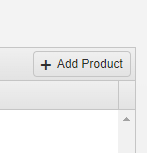
Adding a single product:
Fast-Weigh allows you to assign an unlimited number of Products to an Order. Products can be assigned from any of the Locations/Yards within the given Order Region.
You can add a Product to an Order as many times as needed to allow for varied setups. Please ensure that you add a Pricing Description to each product if there are multiple instances.
 Required fields are notated below with an asterisk *
Required fields are notated below with an asterisk *- * Location: Select a Location where this Order Product will be accessible.
- * Yard: Select the Yard where this Order Product will be available.
- * Product: Select the Product for the given Yard.
 Note: Only Products within the selected Pricing Template will appear here.
Note: Only Products within the selected Pricing Template will appear here.- Hauler: Set a Hauler to restrict ticketing for this product to only a specific Hauler. Leave this blank to allow ticketing for any Hauler.
- Pricing Description: Use this to describe the product.
- If you are adding a Product more than once from the same Yard, this will be necessary to identify which variation of the product should be selected at the time of ticketing.
- Tax Group: If you need to set the tax code at the time of ticketing, you can set a Tax Code Group for the product.
- Tax Code: Select appropriate material tax code. If you are using a Tax Code Group, this Tax Code will be the default.
- Unit Price: Material rate.
- By default, Fast-Weigh will load the default pricing for the Customer associated with the Order.
- Freight Rate: The amount the Customer is charged when invoiced.
- Hauler Rate: The amount owed to an external Hauler.
- Freight Type: Set freight charge by load or unit.
- Surcharge: Surcharge, fee, or miscellaneous charge amounts.
- Surcharge Type: Set surcharge type by load or unit.
- Adjustments: If you use pricing Adjustments, you can assign up to three per product.
- Status: Define the status of the product on an order as active, inactive, or closed.
- Active: The product is selectable for ticketing.
- Inactive: The product unavailable and will not be selectable for ticketing, but may be reactivated and available in the future.
- Closed: The product unavailable, will not be selectable for ticketing, and may no longer be available in the future.
- Active Date: The Product will be inactive and hidden from ticketing until this date.
- This feature is linked to a Product on an Order, not to the Order itself.
- Expiration Date: After this date, the product will become inactive and cannot be used for ticketing.
- Order Quantity: Define a set number of tons or loads for the given product.
- Fast-Weigh has the ability to warn your operator or even prevent ticketing entirely once an order has reached either a load or unit quantity threshold. For this to work, the "Evaluate Order Quantity" setting in the Fast-Weigh Desktop Ticketing App must be enabled (under Settings > Ticket).
- Quantity Type: Set the Order Quantity by load or unit.
- Default Phase: If you have a third-party accounting system that uses accounting phases, the Default Phase field integrates directly with those phases.
- Cost Type: Integrates directly with any cost types used in your third-party accounting system.
- Save the Product
 Note: If you click [+ Add Product] but the product you need is not in the list, please return to Resources > Products and make sure the product has pricing set up for the chosen location.
Note: If you click [+ Add Product] but the product you need is not in the list, please return to Resources > Products and make sure the product has pricing set up for the chosen location.Adding multiple products:
If you are creating an order that needs to have many products added to it at once, you can use the [+ Add Multiple Products] button to quickly do so. 
(Please note that this feature sets the Unit Price for each product based upon the Price Template of the Customer for the order.)
In the new window that opens, you can use the Location, Yard, or Product drop-downs to narrow the list of products you wish to add Click the Refresh button to query for the available products to add to the Order.
Click the Refresh button to query for the available products to add to the Order.
You can then select multiple products at a time using the checkboxes to the left
 As long as Use Template Pricing is checked at the bottom section of the window, any products added will use the default Price Template set for the Order.
As long as Use Template Pricing is checked at the bottom section of the window, any products added will use the default Price Template set for the Order.
Or you can uncheck it to override the price of products using the fields below 
- Once your selection of products to add is complete, click Save!
Updating all products:

You can quickly update information for all of the products on an order as well by using the [Update All Products] button. If you leave a field blank, that field on the products will not be updated.
- Freight Rate: The amount the Customer is charged when Invoiced.
- Hauler Rate: The amount owed to an external Hauler.
- Surcharge: Surcharges, miscellaneous charges, or fees amount.
- Tax Code: Select an appropriate material tax code.
- Active Date: he Product will be inactive and hidden from ticketing until this date.
- This feature is linked to a Product on an Order, not the Order itself.
- Expiration Date: After this date, the product will become inactive and cannot be used for ticketing.
- Delivery Date: The target date for delivery of the product.
- Save the Changes

Deleting all products:

If you need to remove all of the products from an order, you can use the [Delete All Products] button to remove the products en-mass. Please note that you cannot remove a product from an order if a ticket has been created for that Order Product.
Notes & Documents
The Note & Documents tab will allow you to add any internal notes or upload files to use for reference.
- Attached files are only viewable from the Order Setup screen.
- The Notes field can be mapped to a custom report—if requested.
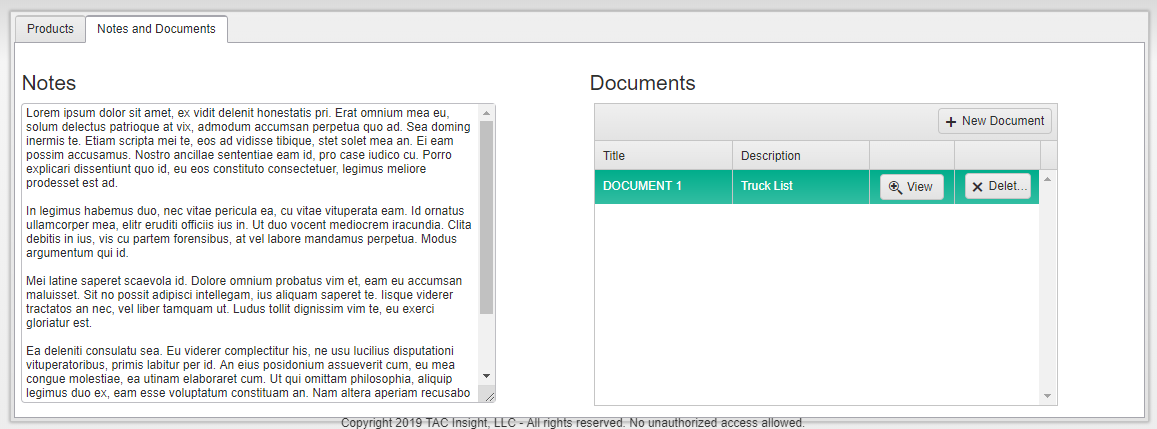
Editing an Existing Order
Navigate to the Order List, and click the Edit button on the desired order.

When you have finished editing the Order, click Save & Close.
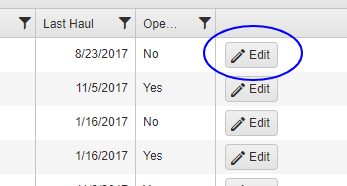
Related Articles
Creating & Managing Dispatches
Fast-Weigh Web Portal To add the Dispatching module to your Fast-Weigh subscription, contact us at 865-219-2980 or support@tacinsight.com Setting up Haulers, Trucks, and Orders for Dispatching Before a truck can be used for a Request, you will need ...Adding & Managing Tax Code Groups 🎥
Fast-Weigh Web Portal Tax Code Groups Click here for more Fast-Weigh training videos. Adding and Managing Tax Code Groups Tax Code Groups can be assigned to a Product on an Order or Quote to allow your scale operator to set the Tax Code for the ...User-Defined Fields (UDFs): Creating & Managing Custom Fields
Fast-Weigh Web Portal UDFs (or User-Defined Fields) are optional, custom fields that be added to your tickets, orders, and truck profiles. Setting up UDFs Click the User-Defined Fields button on the Web Portal Settings to begin setting up UDFs. ...Adding & Managing Sales People
Fast-Weigh Web Portal The Salesperson feature can be used to tie your salespeople to their orders and customers within the Web Portal. Once you setup your salespeople, you can easily assign them to Customers, Quotes, and Orders, as well as view ...Creating & Managing Truck Types
Fast-Weigh Web Portal Truck Types are categories you can assign individual trucks to help organize them. You can add a Default Weight Capacity and/or Default Volume Capacity to automatically apply to any trucks assigned to that truck type. Creating ...

